Comprehensive Report: Teaching in Specialist Area - Education
VerifiedAdded on 2021/01/02
|11
|3420
|453
Report
AI Summary
This report provides a detailed analysis of teaching in a specialist area, addressing the aims of education and training, and exploring related philosophical issues. It outlines the aims and structure of qualifications and learning programs, and discusses approaches to planning and preparing for program delivery. The report examines the inclusiveness of teaching approaches, considering curriculum issues and various teaching and learning resources. It also covers the importance of liaison with others within a specialist area and reviews the effectiveness of teaching methods, including strengths, weaknesses, and opportunities for improvement. The report emphasizes the importance of continuous professional development and updating knowledge and skills to provide effective education to students. The report also discusses the importance of curriculum development and student learning. The report uses examples from subjects such as Maths and English to illustrate the various concepts discussed.
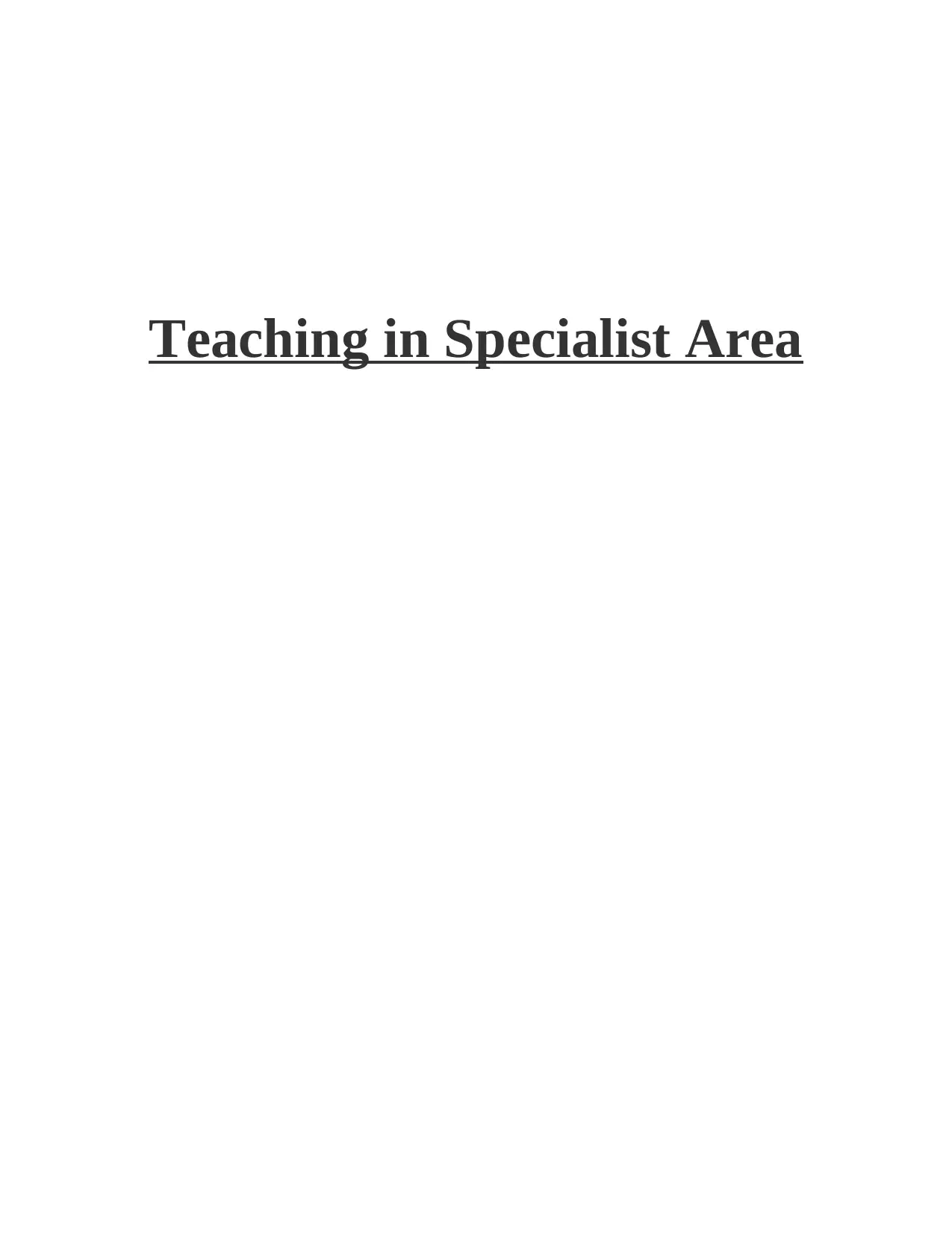
Teaching in Specialist Area
Paraphrase This Document
Need a fresh take? Get an instant paraphrase of this document with our AI Paraphraser
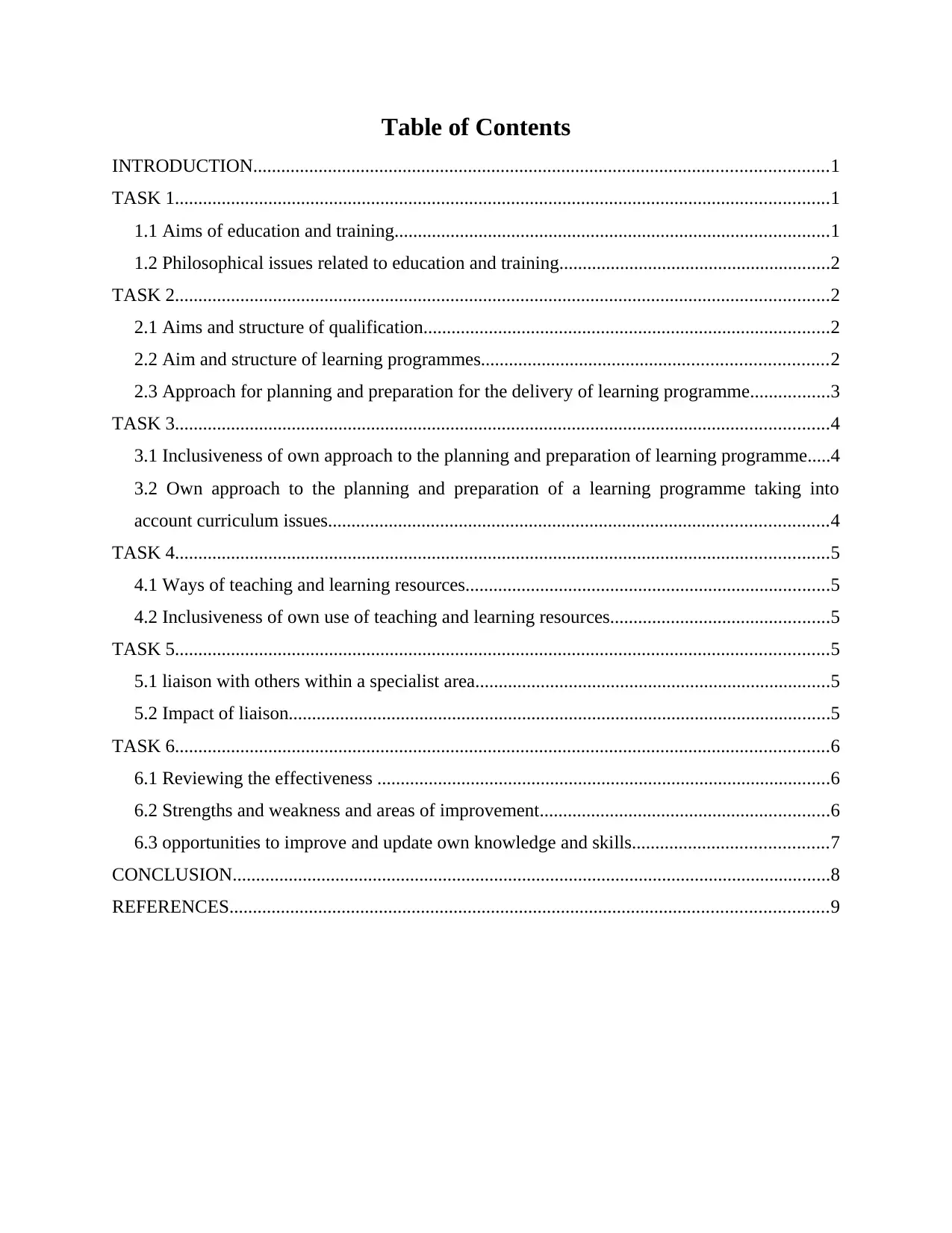
Table of Contents
INTRODUCTION...........................................................................................................................1
TASK 1............................................................................................................................................1
1.1 Aims of education and training.............................................................................................1
1.2 Philosophical issues related to education and training..........................................................2
TASK 2............................................................................................................................................2
2.1 Aims and structure of qualification.......................................................................................2
2.2 Aim and structure of learning programmes..........................................................................2
2.3 Approach for planning and preparation for the delivery of learning programme.................3
TASK 3............................................................................................................................................4
3.1 Inclusiveness of own approach to the planning and preparation of learning programme.....4
3.2 Own approach to the planning and preparation of a learning programme taking into
account curriculum issues...........................................................................................................4
TASK 4............................................................................................................................................5
4.1 Ways of teaching and learning resources..............................................................................5
4.2 Inclusiveness of own use of teaching and learning resources...............................................5
TASK 5............................................................................................................................................5
5.1 liaison with others within a specialist area............................................................................5
5.2 Impact of liaison....................................................................................................................5
TASK 6............................................................................................................................................6
6.1 Reviewing the effectiveness .................................................................................................6
6.2 Strengths and weakness and areas of improvement..............................................................6
6.3 opportunities to improve and update own knowledge and skills..........................................7
CONCLUSION................................................................................................................................8
REFERENCES................................................................................................................................9
INTRODUCTION...........................................................................................................................1
TASK 1............................................................................................................................................1
1.1 Aims of education and training.............................................................................................1
1.2 Philosophical issues related to education and training..........................................................2
TASK 2............................................................................................................................................2
2.1 Aims and structure of qualification.......................................................................................2
2.2 Aim and structure of learning programmes..........................................................................2
2.3 Approach for planning and preparation for the delivery of learning programme.................3
TASK 3............................................................................................................................................4
3.1 Inclusiveness of own approach to the planning and preparation of learning programme.....4
3.2 Own approach to the planning and preparation of a learning programme taking into
account curriculum issues...........................................................................................................4
TASK 4............................................................................................................................................5
4.1 Ways of teaching and learning resources..............................................................................5
4.2 Inclusiveness of own use of teaching and learning resources...............................................5
TASK 5............................................................................................................................................5
5.1 liaison with others within a specialist area............................................................................5
5.2 Impact of liaison....................................................................................................................5
TASK 6............................................................................................................................................6
6.1 Reviewing the effectiveness .................................................................................................6
6.2 Strengths and weakness and areas of improvement..............................................................6
6.3 opportunities to improve and update own knowledge and skills..........................................7
CONCLUSION................................................................................................................................8
REFERENCES................................................................................................................................9
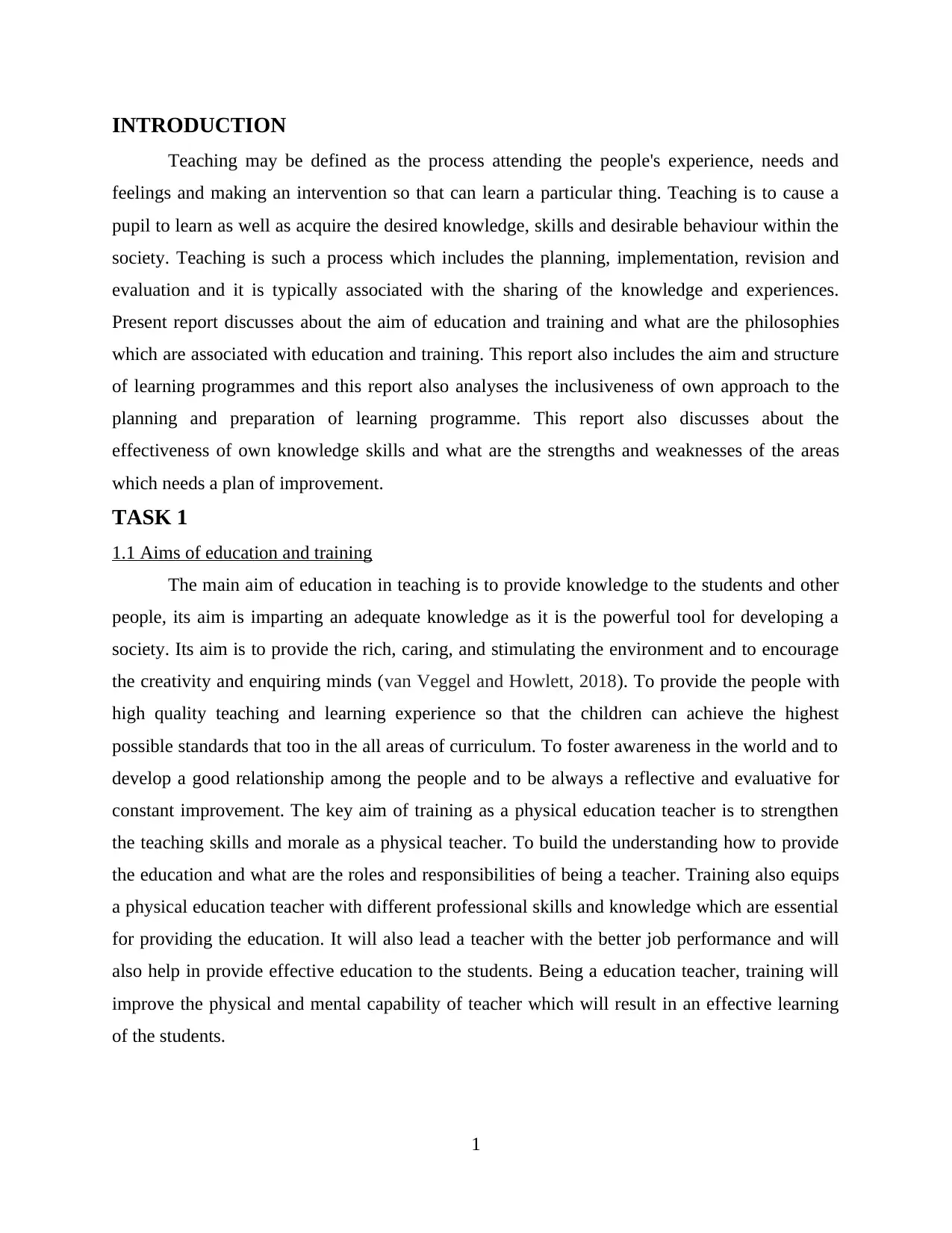
INTRODUCTION
Teaching may be defined as the process attending the people's experience, needs and
feelings and making an intervention so that can learn a particular thing. Teaching is to cause a
pupil to learn as well as acquire the desired knowledge, skills and desirable behaviour within the
society. Teaching is such a process which includes the planning, implementation, revision and
evaluation and it is typically associated with the sharing of the knowledge and experiences.
Present report discusses about the aim of education and training and what are the philosophies
which are associated with education and training. This report also includes the aim and structure
of learning programmes and this report also analyses the inclusiveness of own approach to the
planning and preparation of learning programme. This report also discusses about the
effectiveness of own knowledge skills and what are the strengths and weaknesses of the areas
which needs a plan of improvement.
TASK 1
1.1 Aims of education and training
The main aim of education in teaching is to provide knowledge to the students and other
people, its aim is imparting an adequate knowledge as it is the powerful tool for developing a
society. Its aim is to provide the rich, caring, and stimulating the environment and to encourage
the creativity and enquiring minds (van Veggel and Howlett, 2018). To provide the people with
high quality teaching and learning experience so that the children can achieve the highest
possible standards that too in the all areas of curriculum. To foster awareness in the world and to
develop a good relationship among the people and to be always a reflective and evaluative for
constant improvement. The key aim of training as a physical education teacher is to strengthen
the teaching skills and morale as a physical teacher. To build the understanding how to provide
the education and what are the roles and responsibilities of being a teacher. Training also equips
a physical education teacher with different professional skills and knowledge which are essential
for providing the education. It will also lead a teacher with the better job performance and will
also help in provide effective education to the students. Being a education teacher, training will
improve the physical and mental capability of teacher which will result in an effective learning
of the students.
1
Teaching may be defined as the process attending the people's experience, needs and
feelings and making an intervention so that can learn a particular thing. Teaching is to cause a
pupil to learn as well as acquire the desired knowledge, skills and desirable behaviour within the
society. Teaching is such a process which includes the planning, implementation, revision and
evaluation and it is typically associated with the sharing of the knowledge and experiences.
Present report discusses about the aim of education and training and what are the philosophies
which are associated with education and training. This report also includes the aim and structure
of learning programmes and this report also analyses the inclusiveness of own approach to the
planning and preparation of learning programme. This report also discusses about the
effectiveness of own knowledge skills and what are the strengths and weaknesses of the areas
which needs a plan of improvement.
TASK 1
1.1 Aims of education and training
The main aim of education in teaching is to provide knowledge to the students and other
people, its aim is imparting an adequate knowledge as it is the powerful tool for developing a
society. Its aim is to provide the rich, caring, and stimulating the environment and to encourage
the creativity and enquiring minds (van Veggel and Howlett, 2018). To provide the people with
high quality teaching and learning experience so that the children can achieve the highest
possible standards that too in the all areas of curriculum. To foster awareness in the world and to
develop a good relationship among the people and to be always a reflective and evaluative for
constant improvement. The key aim of training as a physical education teacher is to strengthen
the teaching skills and morale as a physical teacher. To build the understanding how to provide
the education and what are the roles and responsibilities of being a teacher. Training also equips
a physical education teacher with different professional skills and knowledge which are essential
for providing the education. It will also lead a teacher with the better job performance and will
also help in provide effective education to the students. Being a education teacher, training will
improve the physical and mental capability of teacher which will result in an effective learning
of the students.
1
⊘ This is a preview!⊘
Do you want full access?
Subscribe today to unlock all pages.

Trusted by 1+ million students worldwide
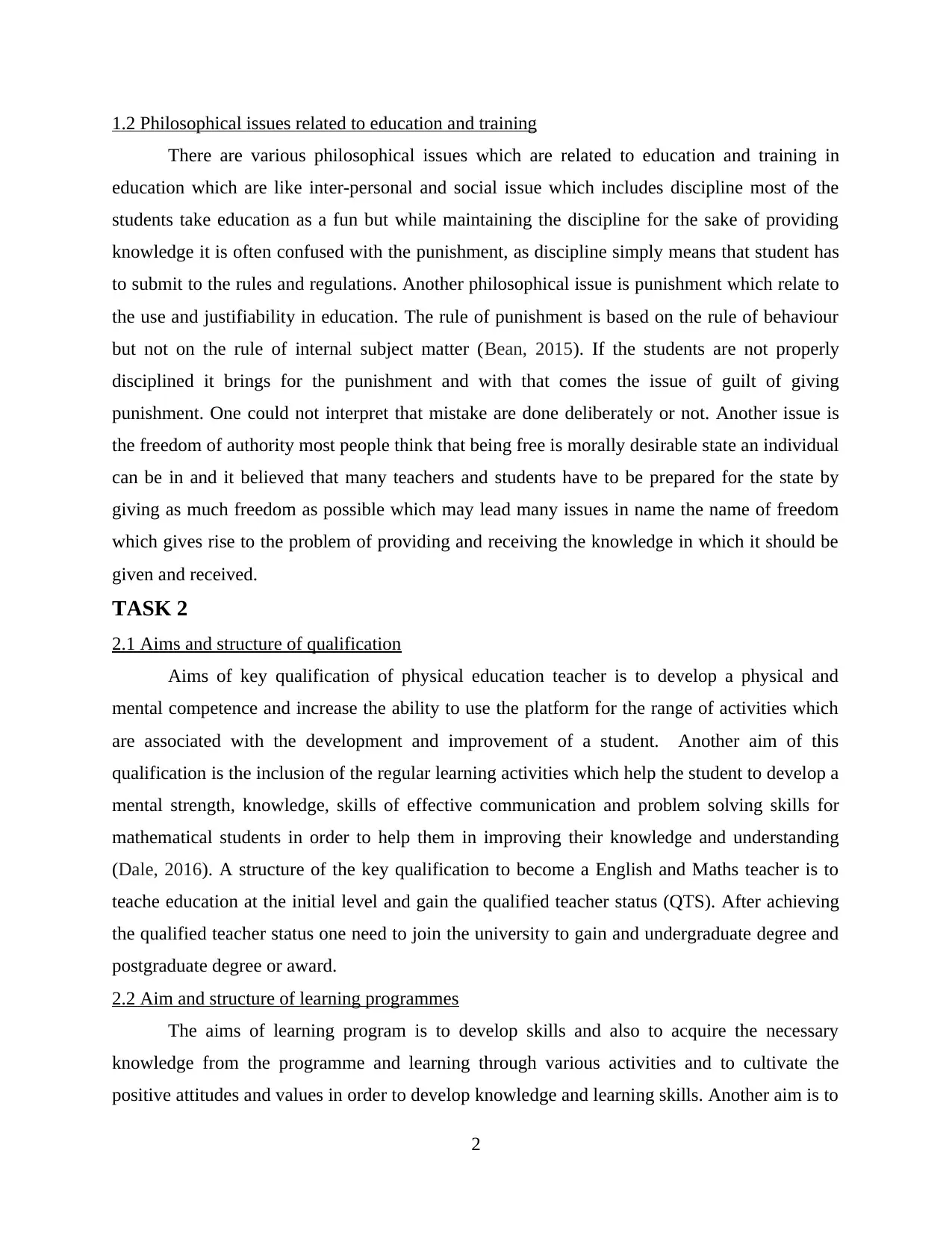
1.2 Philosophical issues related to education and training
There are various philosophical issues which are related to education and training in
education which are like inter-personal and social issue which includes discipline most of the
students take education as a fun but while maintaining the discipline for the sake of providing
knowledge it is often confused with the punishment, as discipline simply means that student has
to submit to the rules and regulations. Another philosophical issue is punishment which relate to
the use and justifiability in education. The rule of punishment is based on the rule of behaviour
but not on the rule of internal subject matter (Bean, 2015). If the students are not properly
disciplined it brings for the punishment and with that comes the issue of guilt of giving
punishment. One could not interpret that mistake are done deliberately or not. Another issue is
the freedom of authority most people think that being free is morally desirable state an individual
can be in and it believed that many teachers and students have to be prepared for the state by
giving as much freedom as possible which may lead many issues in name the name of freedom
which gives rise to the problem of providing and receiving the knowledge in which it should be
given and received.
TASK 2
2.1 Aims and structure of qualification
Aims of key qualification of physical education teacher is to develop a physical and
mental competence and increase the ability to use the platform for the range of activities which
are associated with the development and improvement of a student. Another aim of this
qualification is the inclusion of the regular learning activities which help the student to develop a
mental strength, knowledge, skills of effective communication and problem solving skills for
mathematical students in order to help them in improving their knowledge and understanding
(Dale, 2016). A structure of the key qualification to become a English and Maths teacher is to
teache education at the initial level and gain the qualified teacher status (QTS). After achieving
the qualified teacher status one need to join the university to gain and undergraduate degree and
postgraduate degree or award.
2.2 Aim and structure of learning programmes
The aims of learning program is to develop skills and also to acquire the necessary
knowledge from the programme and learning through various activities and to cultivate the
positive attitudes and values in order to develop knowledge and learning skills. Another aim is to
2
There are various philosophical issues which are related to education and training in
education which are like inter-personal and social issue which includes discipline most of the
students take education as a fun but while maintaining the discipline for the sake of providing
knowledge it is often confused with the punishment, as discipline simply means that student has
to submit to the rules and regulations. Another philosophical issue is punishment which relate to
the use and justifiability in education. The rule of punishment is based on the rule of behaviour
but not on the rule of internal subject matter (Bean, 2015). If the students are not properly
disciplined it brings for the punishment and with that comes the issue of guilt of giving
punishment. One could not interpret that mistake are done deliberately or not. Another issue is
the freedom of authority most people think that being free is morally desirable state an individual
can be in and it believed that many teachers and students have to be prepared for the state by
giving as much freedom as possible which may lead many issues in name the name of freedom
which gives rise to the problem of providing and receiving the knowledge in which it should be
given and received.
TASK 2
2.1 Aims and structure of qualification
Aims of key qualification of physical education teacher is to develop a physical and
mental competence and increase the ability to use the platform for the range of activities which
are associated with the development and improvement of a student. Another aim of this
qualification is the inclusion of the regular learning activities which help the student to develop a
mental strength, knowledge, skills of effective communication and problem solving skills for
mathematical students in order to help them in improving their knowledge and understanding
(Dale, 2016). A structure of the key qualification to become a English and Maths teacher is to
teache education at the initial level and gain the qualified teacher status (QTS). After achieving
the qualified teacher status one need to join the university to gain and undergraduate degree and
postgraduate degree or award.
2.2 Aim and structure of learning programmes
The aims of learning program is to develop skills and also to acquire the necessary
knowledge from the programme and learning through various activities and to cultivate the
positive attitudes and values in order to develop knowledge and learning skills. Another aim is to
2
Paraphrase This Document
Need a fresh take? Get an instant paraphrase of this document with our AI Paraphraser
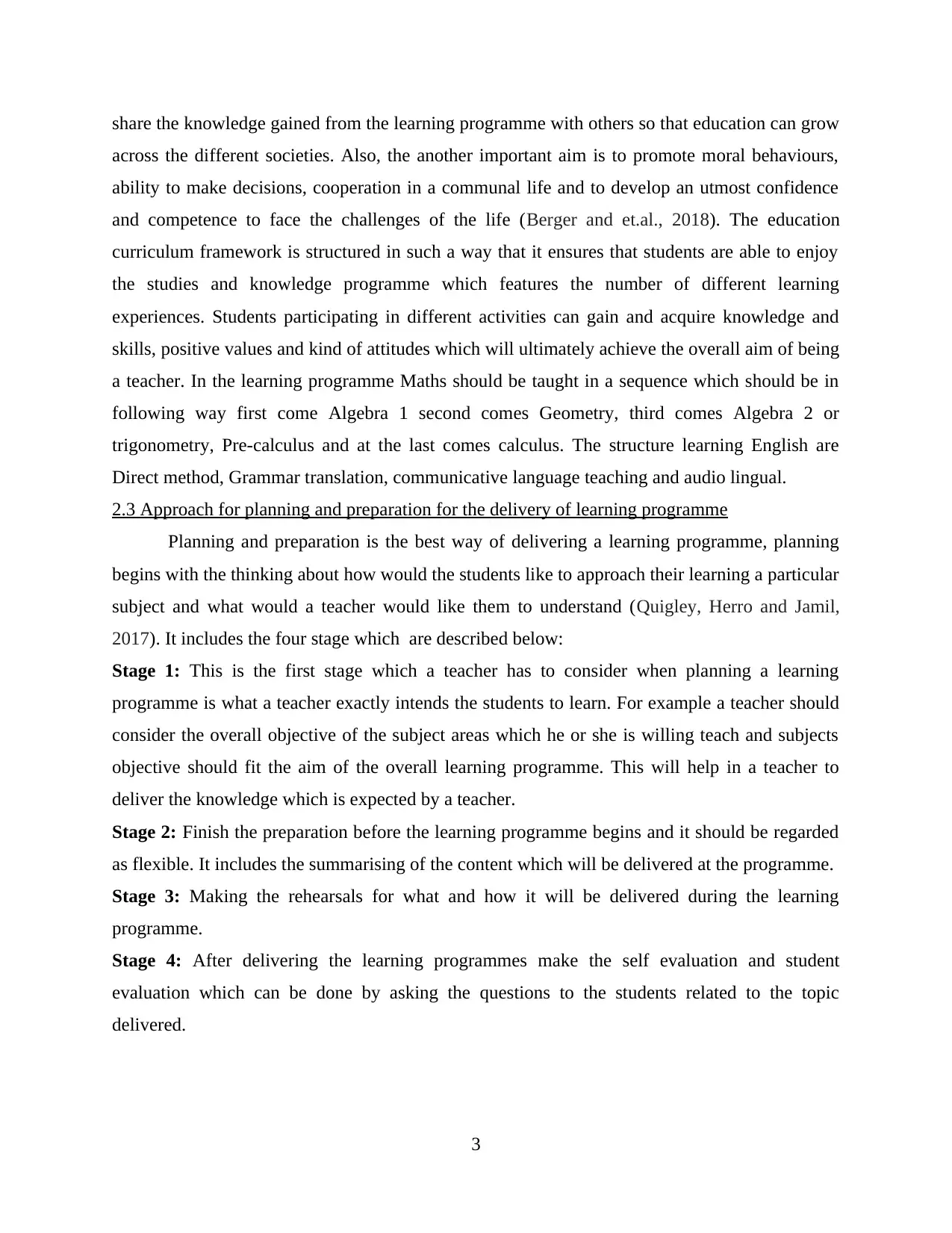
share the knowledge gained from the learning programme with others so that education can grow
across the different societies. Also, the another important aim is to promote moral behaviours,
ability to make decisions, cooperation in a communal life and to develop an utmost confidence
and competence to face the challenges of the life (Berger and et.al., 2018). The education
curriculum framework is structured in such a way that it ensures that students are able to enjoy
the studies and knowledge programme which features the number of different learning
experiences. Students participating in different activities can gain and acquire knowledge and
skills, positive values and kind of attitudes which will ultimately achieve the overall aim of being
a teacher. In the learning programme Maths should be taught in a sequence which should be in
following way first come Algebra 1 second comes Geometry, third comes Algebra 2 or
trigonometry, Pre-calculus and at the last comes calculus. The structure learning English are
Direct method, Grammar translation, communicative language teaching and audio lingual.
2.3 Approach for planning and preparation for the delivery of learning programme
Planning and preparation is the best way of delivering a learning programme, planning
begins with the thinking about how would the students like to approach their learning a particular
subject and what would a teacher would like them to understand (Quigley, Herro and Jamil,
2017). It includes the four stage which are described below:
Stage 1: This is the first stage which a teacher has to consider when planning a learning
programme is what a teacher exactly intends the students to learn. For example a teacher should
consider the overall objective of the subject areas which he or she is willing teach and subjects
objective should fit the aim of the overall learning programme. This will help in a teacher to
deliver the knowledge which is expected by a teacher.
Stage 2: Finish the preparation before the learning programme begins and it should be regarded
as flexible. It includes the summarising of the content which will be delivered at the programme.
Stage 3: Making the rehearsals for what and how it will be delivered during the learning
programme.
Stage 4: After delivering the learning programmes make the self evaluation and student
evaluation which can be done by asking the questions to the students related to the topic
delivered.
3
across the different societies. Also, the another important aim is to promote moral behaviours,
ability to make decisions, cooperation in a communal life and to develop an utmost confidence
and competence to face the challenges of the life (Berger and et.al., 2018). The education
curriculum framework is structured in such a way that it ensures that students are able to enjoy
the studies and knowledge programme which features the number of different learning
experiences. Students participating in different activities can gain and acquire knowledge and
skills, positive values and kind of attitudes which will ultimately achieve the overall aim of being
a teacher. In the learning programme Maths should be taught in a sequence which should be in
following way first come Algebra 1 second comes Geometry, third comes Algebra 2 or
trigonometry, Pre-calculus and at the last comes calculus. The structure learning English are
Direct method, Grammar translation, communicative language teaching and audio lingual.
2.3 Approach for planning and preparation for the delivery of learning programme
Planning and preparation is the best way of delivering a learning programme, planning
begins with the thinking about how would the students like to approach their learning a particular
subject and what would a teacher would like them to understand (Quigley, Herro and Jamil,
2017). It includes the four stage which are described below:
Stage 1: This is the first stage which a teacher has to consider when planning a learning
programme is what a teacher exactly intends the students to learn. For example a teacher should
consider the overall objective of the subject areas which he or she is willing teach and subjects
objective should fit the aim of the overall learning programme. This will help in a teacher to
deliver the knowledge which is expected by a teacher.
Stage 2: Finish the preparation before the learning programme begins and it should be regarded
as flexible. It includes the summarising of the content which will be delivered at the programme.
Stage 3: Making the rehearsals for what and how it will be delivered during the learning
programme.
Stage 4: After delivering the learning programmes make the self evaluation and student
evaluation which can be done by asking the questions to the students related to the topic
delivered.
3
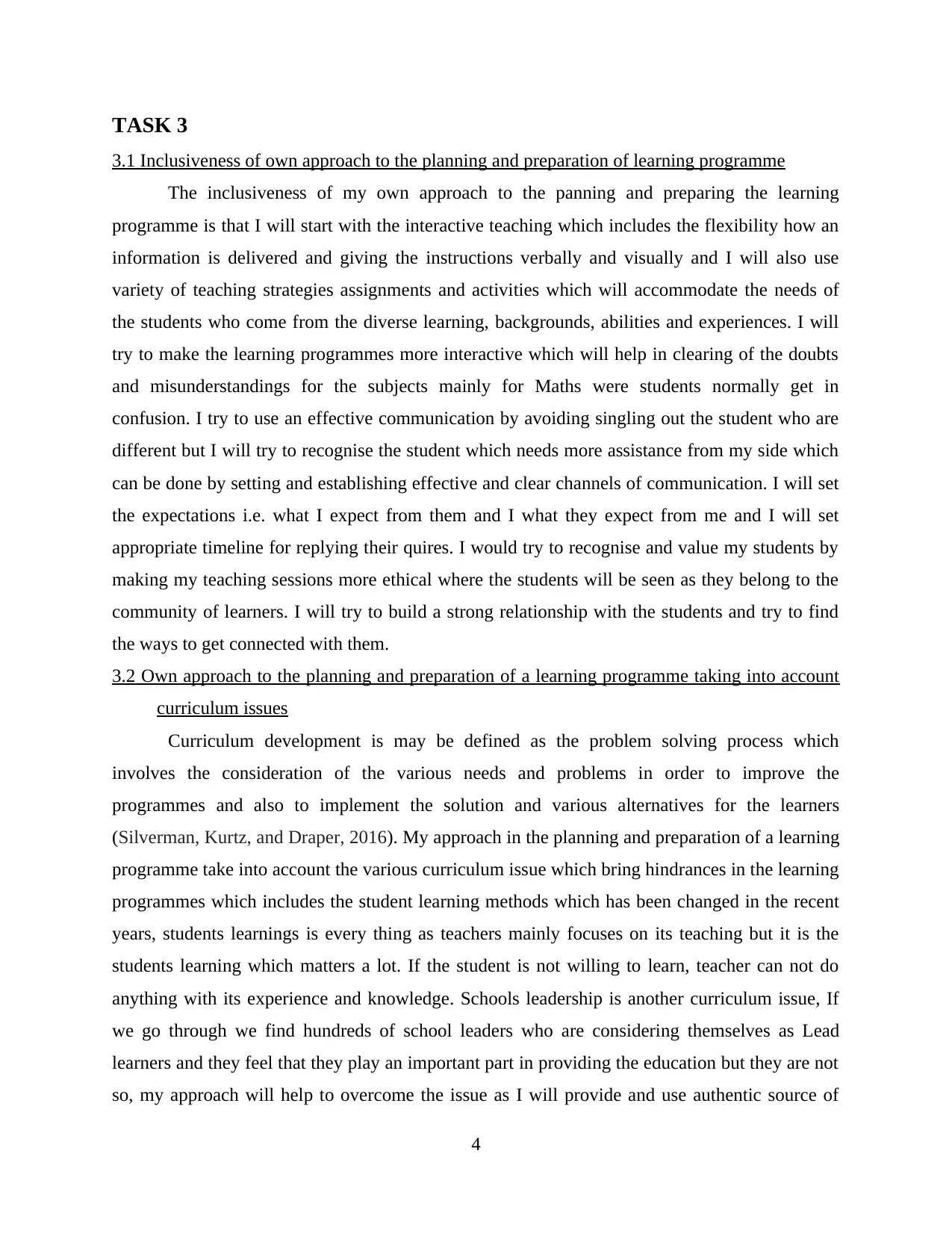
TASK 3
3.1 Inclusiveness of own approach to the planning and preparation of learning programme
The inclusiveness of my own approach to the panning and preparing the learning
programme is that I will start with the interactive teaching which includes the flexibility how an
information is delivered and giving the instructions verbally and visually and I will also use
variety of teaching strategies assignments and activities which will accommodate the needs of
the students who come from the diverse learning, backgrounds, abilities and experiences. I will
try to make the learning programmes more interactive which will help in clearing of the doubts
and misunderstandings for the subjects mainly for Maths were students normally get in
confusion. I try to use an effective communication by avoiding singling out the student who are
different but I will try to recognise the student which needs more assistance from my side which
can be done by setting and establishing effective and clear channels of communication. I will set
the expectations i.e. what I expect from them and I what they expect from me and I will set
appropriate timeline for replying their quires. I would try to recognise and value my students by
making my teaching sessions more ethical where the students will be seen as they belong to the
community of learners. I will try to build a strong relationship with the students and try to find
the ways to get connected with them.
3.2 Own approach to the planning and preparation of a learning programme taking into account
curriculum issues
Curriculum development is may be defined as the problem solving process which
involves the consideration of the various needs and problems in order to improve the
programmes and also to implement the solution and various alternatives for the learners
(Silverman, Kurtz, and Draper, 2016). My approach in the planning and preparation of a learning
programme take into account the various curriculum issue which bring hindrances in the learning
programmes which includes the student learning methods which has been changed in the recent
years, students learnings is every thing as teachers mainly focuses on its teaching but it is the
students learning which matters a lot. If the student is not willing to learn, teacher can not do
anything with its experience and knowledge. Schools leadership is another curriculum issue, If
we go through we find hundreds of school leaders who are considering themselves as Lead
learners and they feel that they play an important part in providing the education but they are not
so, my approach will help to overcome the issue as I will provide and use authentic source of
4
3.1 Inclusiveness of own approach to the planning and preparation of learning programme
The inclusiveness of my own approach to the panning and preparing the learning
programme is that I will start with the interactive teaching which includes the flexibility how an
information is delivered and giving the instructions verbally and visually and I will also use
variety of teaching strategies assignments and activities which will accommodate the needs of
the students who come from the diverse learning, backgrounds, abilities and experiences. I will
try to make the learning programmes more interactive which will help in clearing of the doubts
and misunderstandings for the subjects mainly for Maths were students normally get in
confusion. I try to use an effective communication by avoiding singling out the student who are
different but I will try to recognise the student which needs more assistance from my side which
can be done by setting and establishing effective and clear channels of communication. I will set
the expectations i.e. what I expect from them and I what they expect from me and I will set
appropriate timeline for replying their quires. I would try to recognise and value my students by
making my teaching sessions more ethical where the students will be seen as they belong to the
community of learners. I will try to build a strong relationship with the students and try to find
the ways to get connected with them.
3.2 Own approach to the planning and preparation of a learning programme taking into account
curriculum issues
Curriculum development is may be defined as the problem solving process which
involves the consideration of the various needs and problems in order to improve the
programmes and also to implement the solution and various alternatives for the learners
(Silverman, Kurtz, and Draper, 2016). My approach in the planning and preparation of a learning
programme take into account the various curriculum issue which bring hindrances in the learning
programmes which includes the student learning methods which has been changed in the recent
years, students learnings is every thing as teachers mainly focuses on its teaching but it is the
students learning which matters a lot. If the student is not willing to learn, teacher can not do
anything with its experience and knowledge. Schools leadership is another curriculum issue, If
we go through we find hundreds of school leaders who are considering themselves as Lead
learners and they feel that they play an important part in providing the education but they are not
so, my approach will help to overcome the issue as I will provide and use authentic source of
4
⊘ This is a preview!⊘
Do you want full access?
Subscribe today to unlock all pages.

Trusted by 1+ million students worldwide
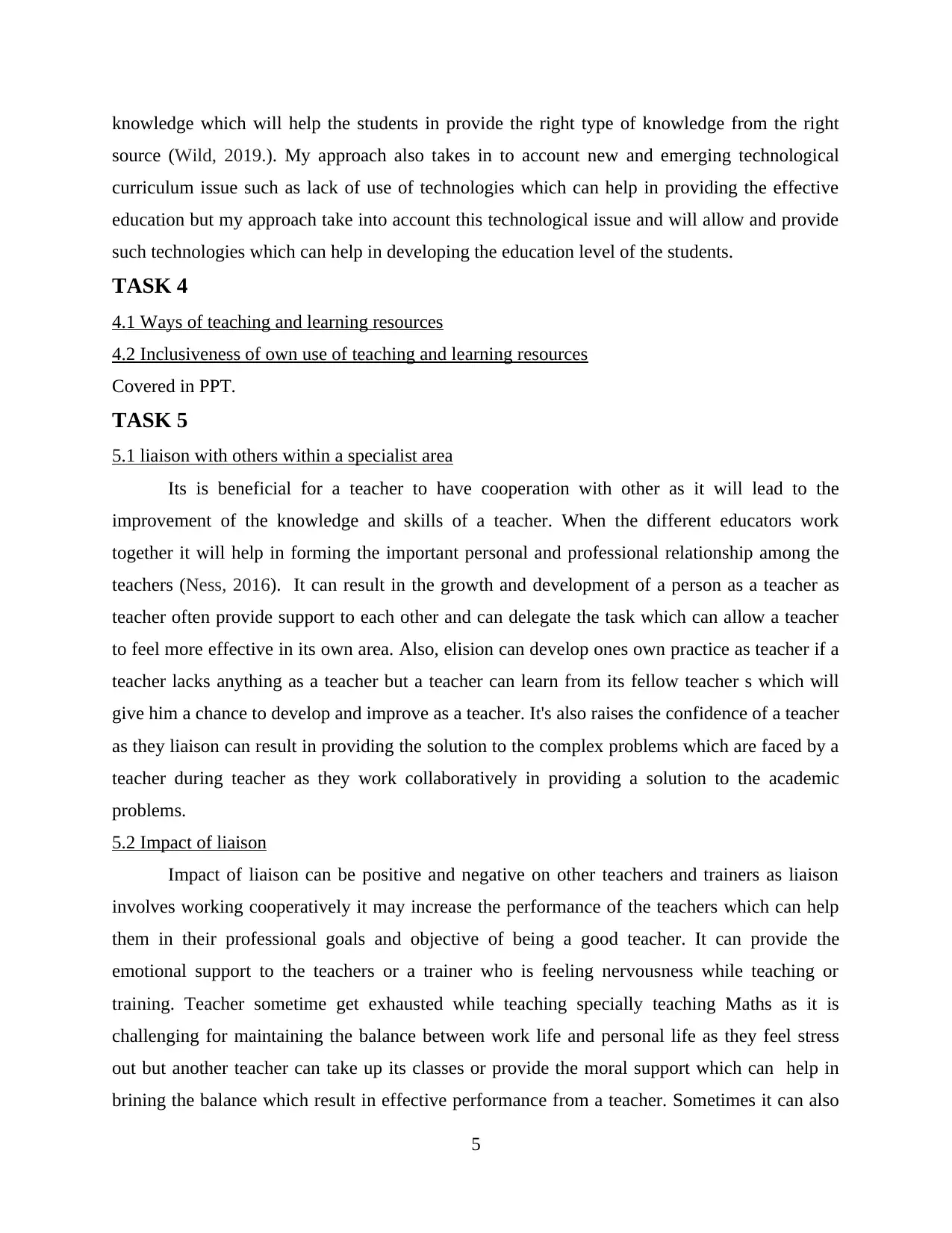
knowledge which will help the students in provide the right type of knowledge from the right
source (Wild, 2019.). My approach also takes in to account new and emerging technological
curriculum issue such as lack of use of technologies which can help in providing the effective
education but my approach take into account this technological issue and will allow and provide
such technologies which can help in developing the education level of the students.
TASK 4
4.1 Ways of teaching and learning resources
4.2 Inclusiveness of own use of teaching and learning resources
Covered in PPT.
TASK 5
5.1 liaison with others within a specialist area
Its is beneficial for a teacher to have cooperation with other as it will lead to the
improvement of the knowledge and skills of a teacher. When the different educators work
together it will help in forming the important personal and professional relationship among the
teachers (Ness, 2016). It can result in the growth and development of a person as a teacher as
teacher often provide support to each other and can delegate the task which can allow a teacher
to feel more effective in its own area. Also, elision can develop ones own practice as teacher if a
teacher lacks anything as a teacher but a teacher can learn from its fellow teacher s which will
give him a chance to develop and improve as a teacher. It's also raises the confidence of a teacher
as they liaison can result in providing the solution to the complex problems which are faced by a
teacher during teacher as they work collaboratively in providing a solution to the academic
problems.
5.2 Impact of liaison
Impact of liaison can be positive and negative on other teachers and trainers as liaison
involves working cooperatively it may increase the performance of the teachers which can help
them in their professional goals and objective of being a good teacher. It can provide the
emotional support to the teachers or a trainer who is feeling nervousness while teaching or
training. Teacher sometime get exhausted while teaching specially teaching Maths as it is
challenging for maintaining the balance between work life and personal life as they feel stress
out but another teacher can take up its classes or provide the moral support which can help in
brining the balance which result in effective performance from a teacher. Sometimes it can also
5
source (Wild, 2019.). My approach also takes in to account new and emerging technological
curriculum issue such as lack of use of technologies which can help in providing the effective
education but my approach take into account this technological issue and will allow and provide
such technologies which can help in developing the education level of the students.
TASK 4
4.1 Ways of teaching and learning resources
4.2 Inclusiveness of own use of teaching and learning resources
Covered in PPT.
TASK 5
5.1 liaison with others within a specialist area
Its is beneficial for a teacher to have cooperation with other as it will lead to the
improvement of the knowledge and skills of a teacher. When the different educators work
together it will help in forming the important personal and professional relationship among the
teachers (Ness, 2016). It can result in the growth and development of a person as a teacher as
teacher often provide support to each other and can delegate the task which can allow a teacher
to feel more effective in its own area. Also, elision can develop ones own practice as teacher if a
teacher lacks anything as a teacher but a teacher can learn from its fellow teacher s which will
give him a chance to develop and improve as a teacher. It's also raises the confidence of a teacher
as they liaison can result in providing the solution to the complex problems which are faced by a
teacher during teacher as they work collaboratively in providing a solution to the academic
problems.
5.2 Impact of liaison
Impact of liaison can be positive and negative on other teachers and trainers as liaison
involves working cooperatively it may increase the performance of the teachers which can help
them in their professional goals and objective of being a good teacher. It can provide the
emotional support to the teachers or a trainer who is feeling nervousness while teaching or
training. Teacher sometime get exhausted while teaching specially teaching Maths as it is
challenging for maintaining the balance between work life and personal life as they feel stress
out but another teacher can take up its classes or provide the moral support which can help in
brining the balance which result in effective performance from a teacher. Sometimes it can also
5
Paraphrase This Document
Need a fresh take? Get an instant paraphrase of this document with our AI Paraphraser
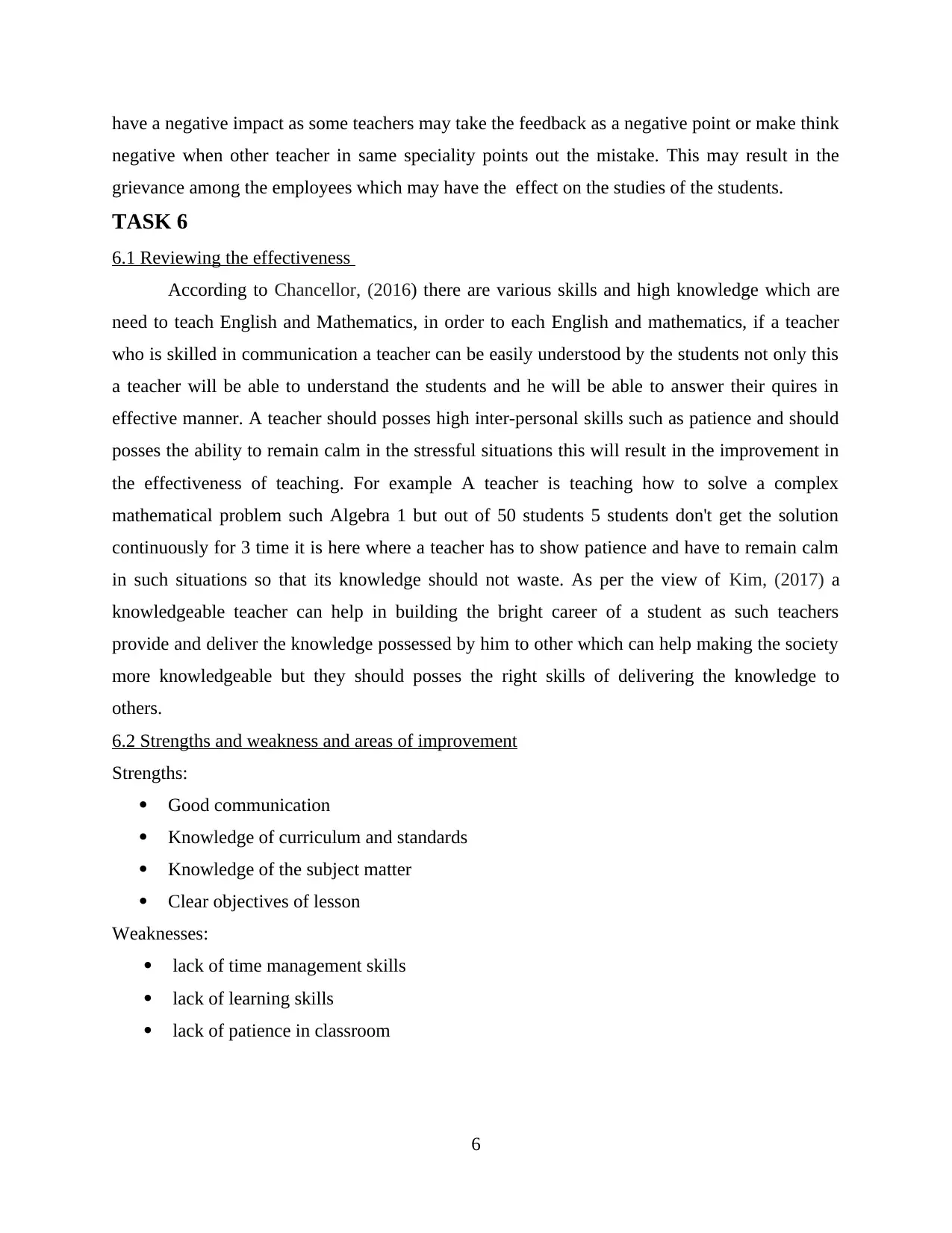
have a negative impact as some teachers may take the feedback as a negative point or make think
negative when other teacher in same speciality points out the mistake. This may result in the
grievance among the employees which may have the effect on the studies of the students.
TASK 6
6.1 Reviewing the effectiveness
According to Chancellor, (2016) there are various skills and high knowledge which are
need to teach English and Mathematics, in order to each English and mathematics, if a teacher
who is skilled in communication a teacher can be easily understood by the students not only this
a teacher will be able to understand the students and he will be able to answer their quires in
effective manner. A teacher should posses high inter-personal skills such as patience and should
posses the ability to remain calm in the stressful situations this will result in the improvement in
the effectiveness of teaching. For example A teacher is teaching how to solve a complex
mathematical problem such Algebra 1 but out of 50 students 5 students don't get the solution
continuously for 3 time it is here where a teacher has to show patience and have to remain calm
in such situations so that its knowledge should not waste. As per the view of Kim, (2017) a
knowledgeable teacher can help in building the bright career of a student as such teachers
provide and deliver the knowledge possessed by him to other which can help making the society
more knowledgeable but they should posses the right skills of delivering the knowledge to
others.
6.2 Strengths and weakness and areas of improvement
Strengths:
Good communication
Knowledge of curriculum and standards
Knowledge of the subject matter
Clear objectives of lesson
Weaknesses:
lack of time management skills
lack of learning skills
lack of patience in classroom
6
negative when other teacher in same speciality points out the mistake. This may result in the
grievance among the employees which may have the effect on the studies of the students.
TASK 6
6.1 Reviewing the effectiveness
According to Chancellor, (2016) there are various skills and high knowledge which are
need to teach English and Mathematics, in order to each English and mathematics, if a teacher
who is skilled in communication a teacher can be easily understood by the students not only this
a teacher will be able to understand the students and he will be able to answer their quires in
effective manner. A teacher should posses high inter-personal skills such as patience and should
posses the ability to remain calm in the stressful situations this will result in the improvement in
the effectiveness of teaching. For example A teacher is teaching how to solve a complex
mathematical problem such Algebra 1 but out of 50 students 5 students don't get the solution
continuously for 3 time it is here where a teacher has to show patience and have to remain calm
in such situations so that its knowledge should not waste. As per the view of Kim, (2017) a
knowledgeable teacher can help in building the bright career of a student as such teachers
provide and deliver the knowledge possessed by him to other which can help making the society
more knowledgeable but they should posses the right skills of delivering the knowledge to
others.
6.2 Strengths and weakness and areas of improvement
Strengths:
Good communication
Knowledge of curriculum and standards
Knowledge of the subject matter
Clear objectives of lesson
Weaknesses:
lack of time management skills
lack of learning skills
lack of patience in classroom
6
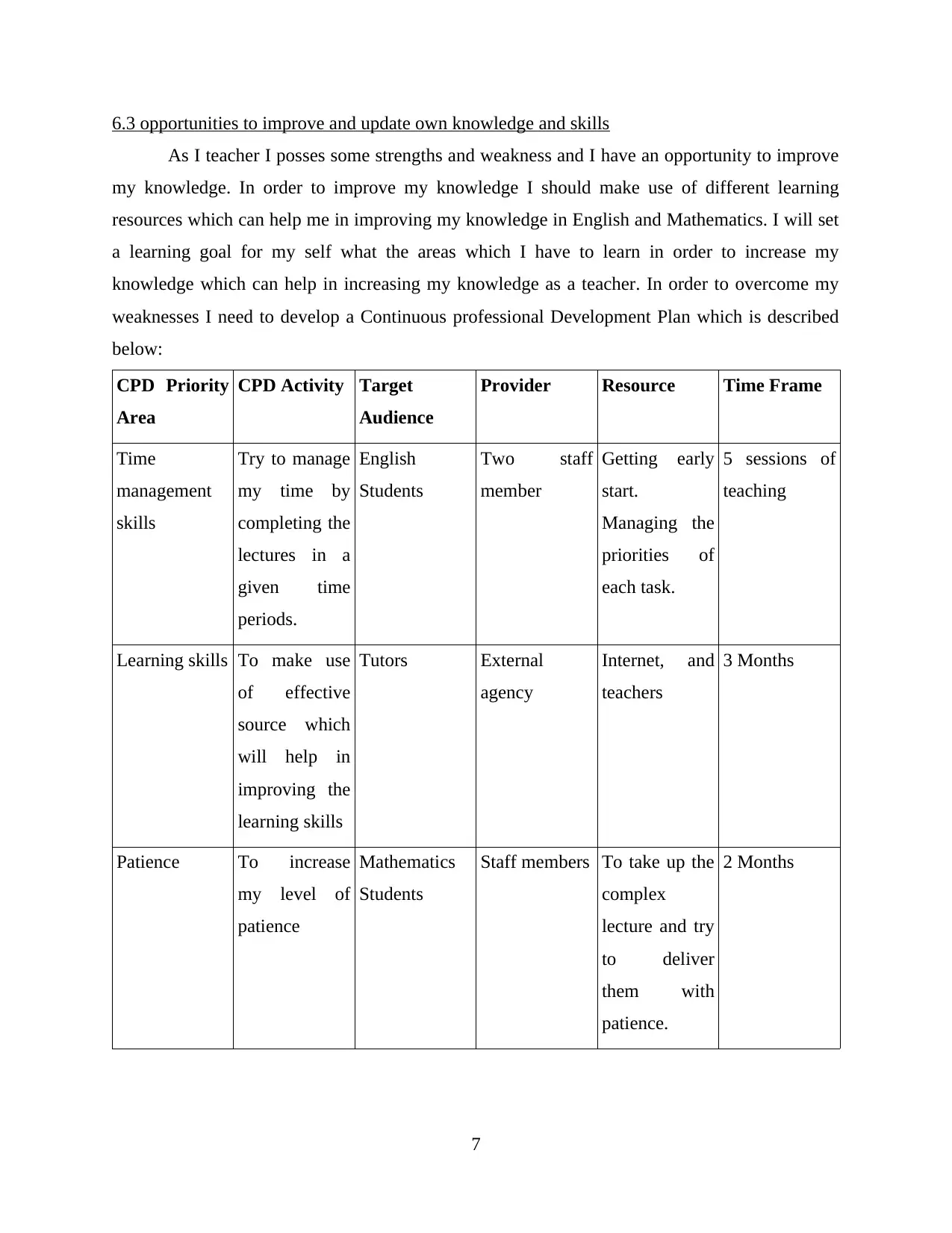
6.3 opportunities to improve and update own knowledge and skills
As I teacher I posses some strengths and weakness and I have an opportunity to improve
my knowledge. In order to improve my knowledge I should make use of different learning
resources which can help me in improving my knowledge in English and Mathematics. I will set
a learning goal for my self what the areas which I have to learn in order to increase my
knowledge which can help in increasing my knowledge as a teacher. In order to overcome my
weaknesses I need to develop a Continuous professional Development Plan which is described
below:
CPD Priority
Area
CPD Activity Target
Audience
Provider Resource Time Frame
Time
management
skills
Try to manage
my time by
completing the
lectures in a
given time
periods.
English
Students
Two staff
member
Getting early
start.
Managing the
priorities of
each task.
5 sessions of
teaching
Learning skills To make use
of effective
source which
will help in
improving the
learning skills
Tutors External
agency
Internet, and
teachers
3 Months
Patience To increase
my level of
patience
Mathematics
Students
Staff members To take up the
complex
lecture and try
to deliver
them with
patience.
2 Months
7
As I teacher I posses some strengths and weakness and I have an opportunity to improve
my knowledge. In order to improve my knowledge I should make use of different learning
resources which can help me in improving my knowledge in English and Mathematics. I will set
a learning goal for my self what the areas which I have to learn in order to increase my
knowledge which can help in increasing my knowledge as a teacher. In order to overcome my
weaknesses I need to develop a Continuous professional Development Plan which is described
below:
CPD Priority
Area
CPD Activity Target
Audience
Provider Resource Time Frame
Time
management
skills
Try to manage
my time by
completing the
lectures in a
given time
periods.
English
Students
Two staff
member
Getting early
start.
Managing the
priorities of
each task.
5 sessions of
teaching
Learning skills To make use
of effective
source which
will help in
improving the
learning skills
Tutors External
agency
Internet, and
teachers
3 Months
Patience To increase
my level of
patience
Mathematics
Students
Staff members To take up the
complex
lecture and try
to deliver
them with
patience.
2 Months
7
⊘ This is a preview!⊘
Do you want full access?
Subscribe today to unlock all pages.

Trusted by 1+ million students worldwide
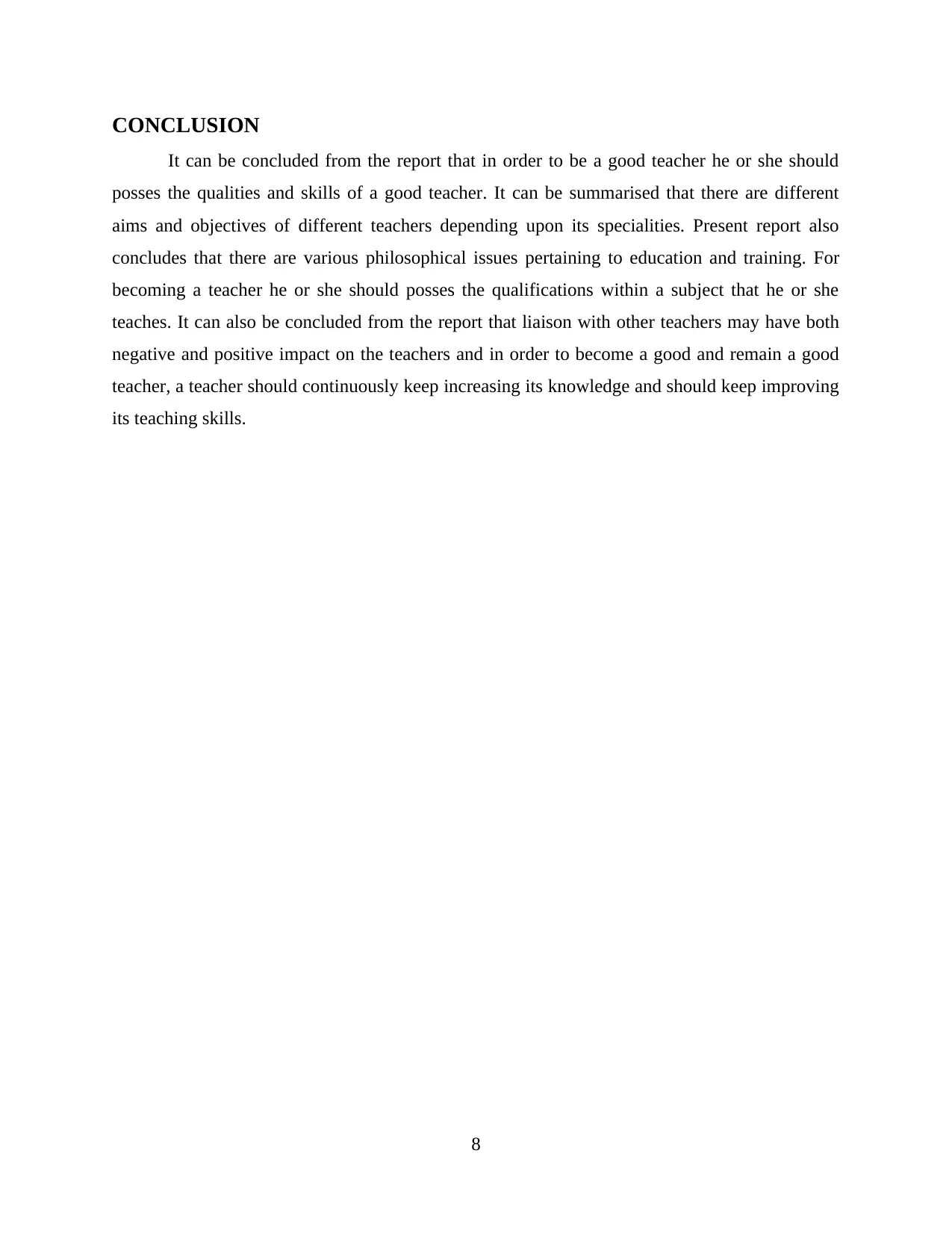
CONCLUSION
It can be concluded from the report that in order to be a good teacher he or she should
posses the qualities and skills of a good teacher. It can be summarised that there are different
aims and objectives of different teachers depending upon its specialities. Present report also
concludes that there are various philosophical issues pertaining to education and training. For
becoming a teacher he or she should posses the qualifications within a subject that he or she
teaches. It can also be concluded from the report that liaison with other teachers may have both
negative and positive impact on the teachers and in order to become a good and remain a good
teacher, a teacher should continuously keep increasing its knowledge and should keep improving
its teaching skills.
8
It can be concluded from the report that in order to be a good teacher he or she should
posses the qualities and skills of a good teacher. It can be summarised that there are different
aims and objectives of different teachers depending upon its specialities. Present report also
concludes that there are various philosophical issues pertaining to education and training. For
becoming a teacher he or she should posses the qualifications within a subject that he or she
teaches. It can also be concluded from the report that liaison with other teachers may have both
negative and positive impact on the teachers and in order to become a good and remain a good
teacher, a teacher should continuously keep increasing its knowledge and should keep improving
its teaching skills.
8
Paraphrase This Document
Need a fresh take? Get an instant paraphrase of this document with our AI Paraphraser
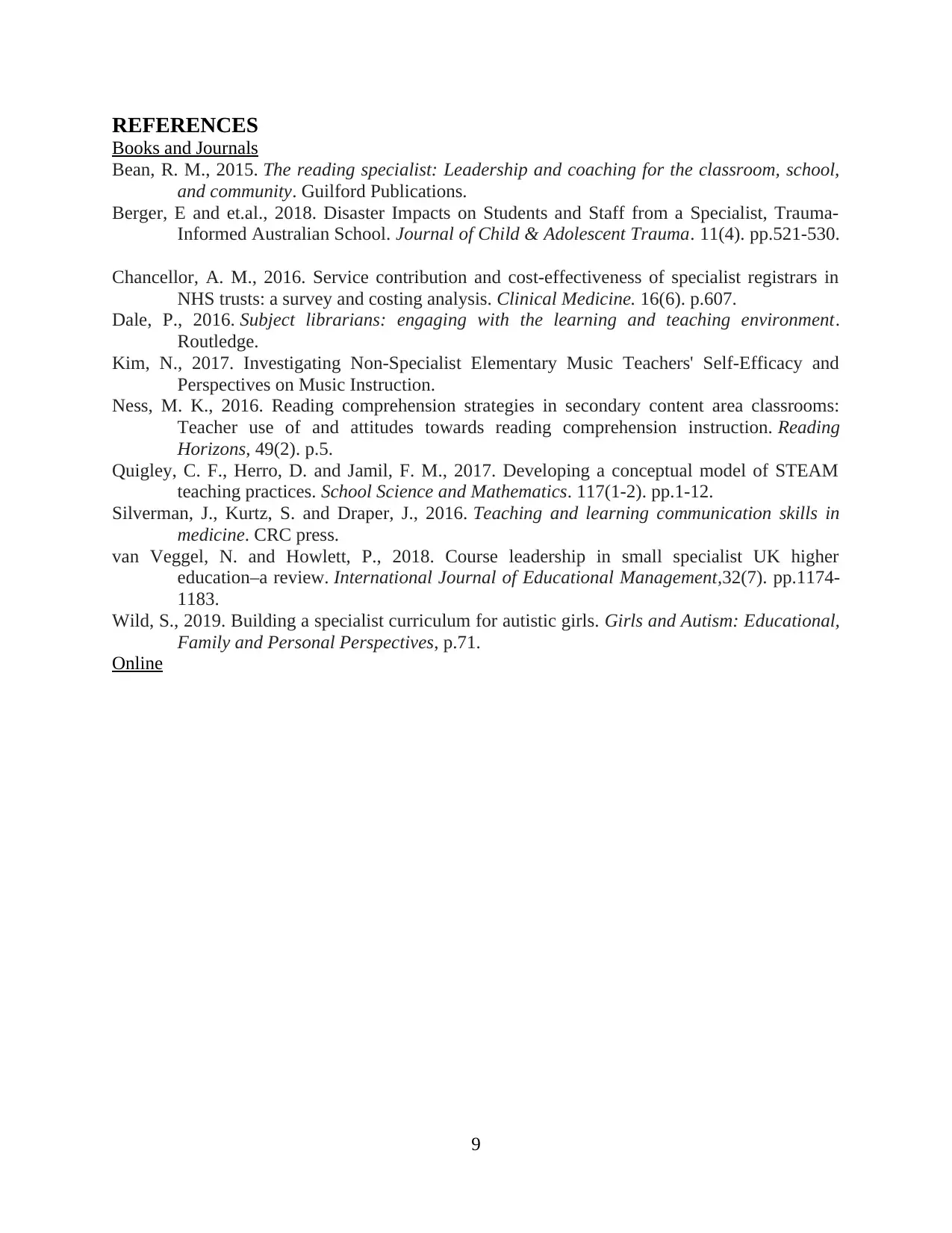
REFERENCES
Books and Journals
Bean, R. M., 2015. The reading specialist: Leadership and coaching for the classroom, school,
and community. Guilford Publications.
Berger, E and et.al., 2018. Disaster Impacts on Students and Staff from a Specialist, Trauma-
Informed Australian School. Journal of Child & Adolescent Trauma. 11(4). pp.521-530.
Chancellor, A. M., 2016. Service contribution and cost-effectiveness of specialist registrars in
NHS trusts: a survey and costing analysis. Clinical Medicine. 16(6). p.607.
Dale, P., 2016. Subject librarians: engaging with the learning and teaching environment.
Routledge.
Kim, N., 2017. Investigating Non-Specialist Elementary Music Teachers' Self-Efficacy and
Perspectives on Music Instruction.
Ness, M. K., 2016. Reading comprehension strategies in secondary content area classrooms:
Teacher use of and attitudes towards reading comprehension instruction. Reading
Horizons, 49(2). p.5.
Quigley, C. F., Herro, D. and Jamil, F. M., 2017. Developing a conceptual model of STEAM
teaching practices. School Science and Mathematics. 117(1-2). pp.1-12.
Silverman, J., Kurtz, S. and Draper, J., 2016. Teaching and learning communication skills in
medicine. CRC press.
van Veggel, N. and Howlett, P., 2018. Course leadership in small specialist UK higher
education–a review. International Journal of Educational Management,32(7). pp.1174-
1183.
Wild, S., 2019. Building a specialist curriculum for autistic girls. Girls and Autism: Educational,
Family and Personal Perspectives, p.71.
Online
9
Books and Journals
Bean, R. M., 2015. The reading specialist: Leadership and coaching for the classroom, school,
and community. Guilford Publications.
Berger, E and et.al., 2018. Disaster Impacts on Students and Staff from a Specialist, Trauma-
Informed Australian School. Journal of Child & Adolescent Trauma. 11(4). pp.521-530.
Chancellor, A. M., 2016. Service contribution and cost-effectiveness of specialist registrars in
NHS trusts: a survey and costing analysis. Clinical Medicine. 16(6). p.607.
Dale, P., 2016. Subject librarians: engaging with the learning and teaching environment.
Routledge.
Kim, N., 2017. Investigating Non-Specialist Elementary Music Teachers' Self-Efficacy and
Perspectives on Music Instruction.
Ness, M. K., 2016. Reading comprehension strategies in secondary content area classrooms:
Teacher use of and attitudes towards reading comprehension instruction. Reading
Horizons, 49(2). p.5.
Quigley, C. F., Herro, D. and Jamil, F. M., 2017. Developing a conceptual model of STEAM
teaching practices. School Science and Mathematics. 117(1-2). pp.1-12.
Silverman, J., Kurtz, S. and Draper, J., 2016. Teaching and learning communication skills in
medicine. CRC press.
van Veggel, N. and Howlett, P., 2018. Course leadership in small specialist UK higher
education–a review. International Journal of Educational Management,32(7). pp.1174-
1183.
Wild, S., 2019. Building a specialist curriculum for autistic girls. Girls and Autism: Educational,
Family and Personal Perspectives, p.71.
Online
9
1 out of 11
Related Documents
Your All-in-One AI-Powered Toolkit for Academic Success.
+13062052269
info@desklib.com
Available 24*7 on WhatsApp / Email
![[object Object]](/_next/static/media/star-bottom.7253800d.svg)
Unlock your academic potential
Copyright © 2020–2025 A2Z Services. All Rights Reserved. Developed and managed by ZUCOL.


